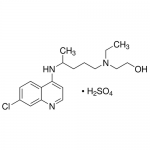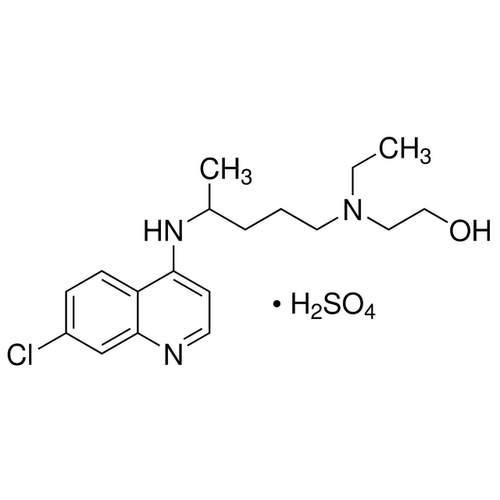| Product Name | Hydroxychloroquine |
| Description |
Autophagy inhibitor |
| Purity | >98% |
| CAS No. | 747-36-4 |
| Molecular Formula | C18H26ClN3O•H2SO4 |
| Molecular Weight | 433.95 |
| Field of Use | Not for use in humans. Not for use in diagnostics or therapeutics. For in vitro research use only. |
Properties
| Storage Temperature | -20ºC |
| Shipping Temperature | Shipped Ambient |
| Product Type | Inhibitor |
| Solubility | Soluble in greater than 20 mg/ml H2O. |
| Source | Synthetic |
| Appearance | White to off-white powder. |
| SMILES | C1=C2C(=CC(=C1)Cl)N=CC=C2NC(CCCN(CCO)CC)C.O=[S](O)(O)=O |
| InChI | InChI=1S/C18H26ClN3O.H2O4S/c1-3-22(11-12-23)10-4-5-14(2)21-17-8-9-20-18-13-15(19)6-7-16(17)18;1-5(2,3)4/h6-9,13-14,23H,3-5,10-12H2,1-2H3,(H,20,21);(H2,1,2,3,4) |
| InChIKey | JCBIVZZPXRZKTI-UHFFFAOYSA-N |
| Safety Phrases |
Classification: Acute toxicity, Oral (Category 4), Eye irritation (Category 2A) Safety Phrases: S22 - Do not breathe dust. S24/25 - Avoid contact with skin and eyes. S36/37/39 - Wear suitable protective clothing, gloves and eye/face protection. Hazard statements: H302- Harmful if swallowed. H319- Causes serious eye irritation. Precautionary statements: P264- Wash skin thoroughly after handling. P270- Do not eat, drink or smoke when using this product. P280- Wear protective gloves/ eye protection/ face protection. P301 + P312- IF SWALLOWED: Call a POISON CENTER or doctor/ physician if you feel unwell. P305 + P351 + P338- IF IN EYES: Rinse cautiously with water for several minutes. Remove contact lenses, if present and easy to do. Continue rinsing. P330- Rinse mouth. P337 + P313- If eye irritation persists: Get medical advice/ attention. P501- Dispose of contents/ container to an approved waste disposal plant. |
| Cite This Product | Hydroxychloroquine (StressMarq Biosciences Inc., Victoria BC CANADA, Catalog # SIH-400) |
Biological Description
| Alternative Names | Hydroxychloroquine sulphate, 7-Chloro-4-[4-(N-ethyl-N-b-hydroxyethylamino)-1-methylbutylamino]quinoline |
| Research Areas | Autophagy, Cancer |
| PubChem ID | 12947 |
| Scientific Background | Hydroxychloroquine is a lysosomotropic agent known for its ability to inhibit autophagy by increasing lysosomal pH and preventing autophagosome-lysosome fusion. In neuroscience, hydroxychloroquine is used to study autophagic flux and lysosomal function in models of neurodegenerative diseases such as Alzheimer's and Parkinson's. By disrupting autophagy, it helps elucidate the role of protein clearance and organelle recycling in neuronal survival. Additionally, hydroxychloroquine exhibits immunomodulatory effects, making it relevant in neuroinflammation research. Its dual action on autophagy and immune signaling provides insights into the cellular mechanisms underlying neurodegeneration and offers potential therapeutic avenues for modulating disease progression. |
| References |
1. van Loosdregt J., et al. (2013) J Allergy Clin Immunol. 131(5): 1443-6.e1. 2. Lotze M.T., et al. (2013) Cancer J. 19(4): 341-7. 3. Xie X., et al. (2013) PLoS One. 8(1): e55096. |



Reviews
There are no reviews yet.